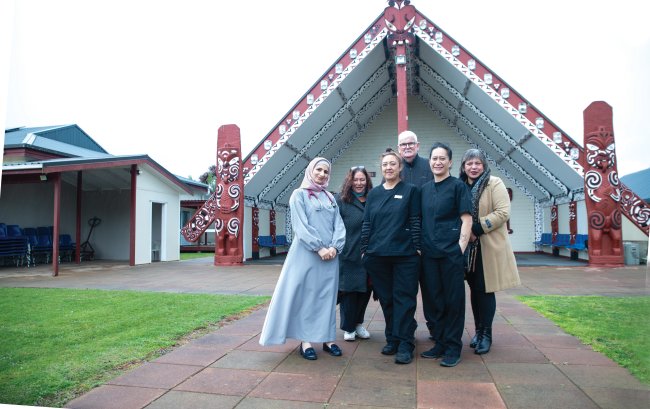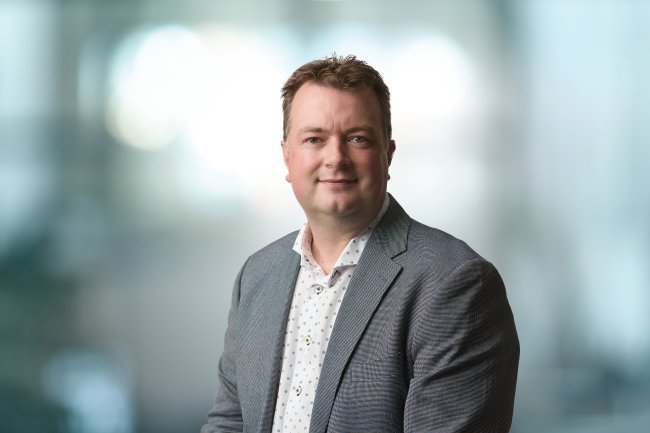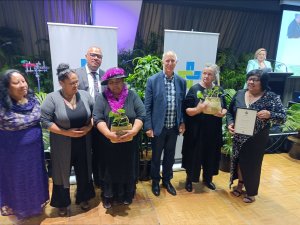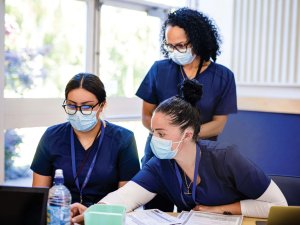Respiratory physician Lutz Beckert considers chronic obstructive pulmonary disease management, including the prevention of COPD, the importance of smoking cessation and pulmonary rehabilitation, and the lifesaving potential of addressing treatable traits. He also discusses the logic of inhaler therapy, moving from single therapy to dual and triple therapy when indicated, as well as other aspects of management
West Bank to Waikato: Raised under occupation, Dr Ruba finds peace in Mangatoatoa
West Bank to Waikato: Raised under occupation, Dr Ruba finds peace in Mangatoatoa

Kia ora, please enjoy our Summer Hiatus selection of stories and comment from throughout 2023, curated by our editorial team. This article was first published on 30 August. We will be back from our summer break on 15 January. Happy reading
Chosen by Stephen: Ruba Harfeil has a compelling story to tell about her journey from the West Bank to her work as a registrar in the small Waikato settlement of Mangatoatoa Paa. Dr Harfeil discusses her commitment to medicine and the people of the small town, as well as her own inner-demons after leaving her homeland for a new country. Her story ran before the recent conflict in Gaza
GP registrar Ruba Harfeil’s eyes shine with the enthusiasm she feels for her role supporting the small rural Waikato settlement of Mangatoatoa Paa.
And Dr Harfeil’s past serves her every day as a doctor with Te Awamutu Medical Centre.
Born in Jordan, she grew up under Israeli occupation in Jerusalem in the Palestinian West Bank. The landlocked territory has been occupied by Israel since the 1967 Six-Day War.
Her family eventually left the country and settled back in Jordan.
Dr Harfeil, 37, emigrated to New Zealand with her husband in 2012 and has been working at Te Awamutu Medical Centre since February last year.
You will find Mangatoatoa Paa down an unsealed road, with the historic Mangatoatoa Marae at its centre and surrounded by a small number of houses. The nearest shops are 4km away in Kihikihi and, despite the fact it’s only another 5km north to Te Awamutu, Mangatoatoa Paa is definitely off the beaten track.
The Whare Hauora Mangatoatoa clinic on the marae provides free healthcare to Māori who are affiliated to any of the area’s eight marae.
“All services are provided free of charge for all paa whānau and those residing within the [wider] Te Mawhai area,” Dr Harfeil says. “This includes free GP consults, free diabetes nurse consults, free pharmacist consults, free screening and free prescriptions.”
The marae, near the banks of the Pūniu River, has three primary hapū: Parewaeono, Ngutu and Pare te Kawa of Ngāti Maniapoto.
The nurses and doctors have been amazing. We’re now seeing better outcomes for our whānau
Dr Harfeil says the idea of a clinic came about after a conversation with Te Awamutu Medical Centre general manager Wayne Lim. Both were keen to provide free community health services for Māori outside of the medical centre.
Two colleagues, registered nurse Tash Clifton and health navigator Rangi Paraha, discussed the idea with Mangatoatoa Marae chair Derek Roberts, who was in favour.
The clinic received three months’ funding from the Raukawa Charitable Trust, which helped get the services off the ground.
“It took us about four months to organise things and the first clinic was [held] in August last year,” says Dr Harfeil.
In October, PHO Pinnacle Midlands Health Network, along with Waikato-Tainui, agreed to help with funding.
The clinic provides a range of services, including GP, pharmacist Rachel Bell, nutritionist, health navigator, nurses and rongoā Māori practitioners. Vaccinations, cervical screening and sometimes mammography can be done on site. Te Awamutu Medical Centre staff also do regular home visits as part of the service.
The clinic was fully booked on its first day, says Mr Lim: “It’s been very encouraging how quickly it has taken off…And we saw people on the first day who needed to see a GP.”
Originally held one half-day a fortnight, the service is now provided one day a fortnight.
Dr Harfeil would like to see the service expanded to once a week.
“There are still a lot of other things that we could do to improve whānau health, but this is the first step towards equity,” she says.
Many of the initial patients had never been to a GP before, “but now I see a lot of them every time we have a clinic”.
Taking healthcare to the people is the key. “Tash calls up the patients to remind them they have to have a screening, or a mammogram and triages patients before I see them.”
Dr Harfeil lives in nearby Ōhaupō and is counting down the days until she finishes her training: “I’ve only got five more months to go.”
She has no plans to leave the area or her role with the marae clinic.
Rates of diabetes, heart disease, chronic obstructive pulmonary disease and asthma in the local community are high and she is keen to help turn around the bad statistics.
“I think we’re making big changes in our patients’ lives,” says Dr Harfeil. “Most of these patients are coming back on a regular basis, so it is working.”
Many Māori feel a distrust in the health system, she says.
“We had one patient who had breast cancer 10 years ago. She had a bad experience with a doctor and declined chemotherapy.” She had undergone surgery, but didn’t attend any follow-up appointments or scans.
Dr Harfeil saw her about a chest infection and found the patient didn’t want to talk about breast cancer. It took about three visits before the subject could be discussed.
“She eventually agreed to a full body scan and a mammogram. It ended up she didn’t have metastasis and didn’t have any cancer in her body.”
It’s all about a longer-term approach: “It takes time to build that trust. But when we do manage to build that trust, we are able to break down barriers.”
Growing up under Israeli occupation, Dr Harfeil feels she can relate to the struggles Māori have faced because of colonialism.
Dr Harfeil returned to the West Bank in 2018 with her three children, but she says it was a traumatic experience for them. Having grown up in New Zealand, they found it too hard to deal with the endless checkpoints, body searches and surveillance in the Occupied Territories.
Dr Harfeil has since returned to the Middle East, but met her family in Jordan to avoid the daily pressure of occupation. She and her husband were living in Jordan when they decided to move to New Zealand; he had gained a PhD scholarship in accounting at the University of Waikato.
It was in Jordan that Dr Harfeil trained as a doctor. (Her father is an immunologist and a professor at the Jordan University of Science and Technology, while her mother is a former chemistry lecturer.)
Migration brought challenges, especially as her first child was then just 15 months old, and with arrival came a culture shock. Dr Harfeil found she was one of very few women who wore a hijab.
But it wasn’t long before she got a job as a phlebotomist, alongside taking her medical registration exams.
Although she had previously studied English in the classroom, her first job helped her with speaking the language.
She soon picked up a role as an observer in general medicine at Waikato Hospital and in 2017 was employed as a house officer, before starting GP training in 2021. She had always been attracted to general practice.
“I wanted to be a GP as it’s part of my personality,” she says.
“I like to have a long-term relationship with my patients and at a hospital you don’t get that.
“My patients feel like a big family to me. I see them all the time and I know their families. I know their children and that’s what I like about being a GP, that continuity of care.”
Mr Roberts says the decision to open the clinic at the marae was, to him, a total no-brainer. It has filled a gap for the isolated community, says Mr Roberts, a former mental health nurse.
“For some of the older people who don’t go into the doctor in town, it’s been great,” he says.
“It’s really serving its purpose. And the nurses and doctors have been amazing. We’re now seeing better outcomes for our whānau.”
Health navigator Ms Paraha is also pleased by the growth of the marae venture. “It’s literally been from the bottom up,” she says.
Te Awamutu Medical Centre staff knew they had to change the way they were providing healthcare to the small rural settlement of Mangatoatoa Paa, says the centre’s general manager, Wayne Lim.
Working out what and how to change took a team effort and much-needed support from the local marae, Mr Lim says.
Centre team members were regularly visiting patients in the area and considered providing a mobile clinic. “But we thought it was better to investigate things further with the people at the marae,” he says.
It made sense to set up a clinic at Mangatoatoa Marae and, with marae chair Derek Roberts supporting it, the pieces began to fall into place.
Raukawa Charitable Trust provided funding for the first three months for copayments and prescription fees, while the medical centre covered the staffing costs.
“That was just to test it was a sustainable model and to see if there was demand for it,” Mr Lim says.
“Then at the end of the three months, we went to Pinnacle [Midlands Health Network PHO] to ask for their support and they agreed to provide funding.”
Mangatoatoa Marae was then able to get additional funding from the iwi, Waikato-Tainui, towards the buildings that now make up the clinic and to upgrade the wi-fi.
Pinnacle chief executive Justin Butcher says the PHO was invited to a hui in October last year at Mangatoatoa, where the marae trust outlined the project under way with the medical centre.
“What we saw was a whānau-centred, community-based model we knew could work, provided it had the right support,” Mr Butcher says.
“Marae clinics are successful when they’re supported to make their own decisions around how they deliver care to whānau.”
If Pinnacle had funded copayments and prescription fees, says Mr Butcher, it would have forced the clinic to operate a “traditional capitation-based model of care”.
“We funded capacity for a primary care team, but beyond that the marae clinic has tino rangatiratanga around their own operating decisions and whānau-centric delivery of hauora services.”
Pinnacle supports a number of marae and community-based outreach clinics around the country, including in Meremere (north Waikato), Otawhiwhi (Waihi Beach), Kai a te Mata (near Morrinsville), and Parihaka and Manaia (Taranaki).
“A strong health system centres around high-quality primary care and community services that are continually developing and evolving to meet local need,” says Mr Butcher.
“We play our part by ensuring the right resources and capacity are in place so whānau and communities can thrive.”








![Barbara Fountain, editor of New Zealand Doctor Rata Aotearoa, and Paul Hutchison, GP and senior medical clinician at Tāmaki Health [Image: Simon Maude]](/sites/default/files/styles/thumbnail_cropped_100/public/2025-03/Barbara%20Fountain%2C%20editor%20of%20New%20Zealand%20Doctor%20Rata%20Aotearoa%2C%20and%20Paul%20Hutchison%2C%20GP%20and%20senior%20medical%20clinician%20at%20T%C4%81maki%20Health%20CR%20Simon%20Maude.jpg?itok=-HbQ1EYA)
![Lori Peters, NP and advanced health improvement practitioner at Mahitahi Hauora, and Jasper Nacilla, NP at The Terrace Medical Centre in Wellington [Image: Simon Maude]](/sites/default/files/styles/thumbnail_cropped_100/public/2025-03/2.%20Lori%20Peters%2C%20NP%20and%20advanced%20HIP%20at%20Mahitahi%20Hauora%2C%20and%20Jasper%20Nacilla%2C%20NP%20at%20The%20Terrace%20Medical%20Centre%20in%20Wellington%20CR%20Simon%20Maude.jpg?itok=sUfbsSF1)
![Ministry of Social Development health and disability coordinator Liz Williams, regional health advisors Mary Mojel and Larah Takarangi, and health and disability coordinators Rebecca Staunton and Myint Than Htut [Image: Simon Maude]](/sites/default/files/styles/thumbnail_cropped_100/public/2025-03/3.%20Ministry%20of%20Social%20Development%27s%20Liz%20Williams%2C%20Mary%20Mojel%2C%20Larah%20Takarangi%2C%20Rebecca%20Staunton%20and%20Myint%20Than%20Htut%20CR%20Simon%20Maude.jpg?itok=9ceOujzC)
![Locum GP Helen Fisher, with Te Kuiti Medical Centre NP Bridget Woodney [Image: Simon Maude]](/sites/default/files/styles/thumbnail_cropped_100/public/2025-03/4.%20Locum%20GP%20Helen%20Fisher%2C%20with%20Te%20Kuiti%20Medical%20Centre%20NP%20Bridget%20Woodney%20CR%20Simon%20Maude.jpg?itok=TJeODetm)
![Ruby Faulkner, GPEP2, with David Small, GPEP3 from The Doctors Greenmeadows in Napier [Image: Simon Maude]](/sites/default/files/styles/thumbnail_cropped_100/public/2025-03/5.%20Ruby%20Faulkner%2C%20GPEP2%2C%20with%20David%20Small%2C%20GPEP3%20from%20The%20Doctors%20Greenmeadows%20in%20Napier%20CR%20Simon%20Maude.jpg?itok=B0u4wsIs)
![Rochelle Langton and Libby Thomas, marketing advisors at the Medical Protection Society [Image: Simon Maude]](/sites/default/files/styles/thumbnail_cropped_100/public/2025-03/6.%20Rochelle%20Langton%20and%20Libby%20Thomas%2C%20marketing%20advisors%20at%20the%20Medical%20Protection%20Society%20CR%20Simon%20Maude.jpg?itok=r52_Cf74)
![Specialist GP Lucy Gibberd, medical advisor at MPS, and Zara Bolam, urgent-care specialist at The Nest Health Centre in Inglewood [Image: Simon Maude]](/sites/default/files/styles/thumbnail_cropped_100/public/2025-03/7.%20Specialist%20GP%20Lucy%20Gibberd%2C%20medical%20advisor%20at%20MPS%2C%20and%20Zara%20Bolam%2C%20urgent-care%20specialist%20at%20The%20Nest%20Health%20Centre%20in%20Inglewood%20CR%20Simon%20Maude.jpg?itok=z8eVoBU3)
![Olivia Blackmore and Trudee Sharp, NPs at Gore Health Centre, and Gaylene Hastie, NP at Queenstown Medical Centre [Image: Simon Maude]](/sites/default/files/styles/thumbnail_cropped_100/public/2025-03/8.%20Olivia%20Blackmore%20and%20Trudee%20Sharp%2C%20NPs%20at%20Gore%20Health%20Centre%2C%20and%20Gaylene%20Hastie%2C%20NP%20at%20Queenstown%20Medical%20Centre%20CR%20Simon%20Maude.jpg?itok=Z6u9d0XH)
![Mary Toloa, specialist GP at Porirua and Union Community Health Service in Wellington, Mara Coler, clinical pharmacist at Tū Ora Compass Health, and Bhavna Mistry, specialist GP at Porirua and Union Community Health Service [Image: Simon Maude]](/sites/default/files/styles/thumbnail_cropped_100/public/2025-03/9.%20Mary%20Toloa%2C%20Porirua%20and%20Union%20Community%20Health%20Service%20in%20Wellington%2C%20Mara%20Coler%2C%20T%C5%AB%20Ora%20Compass%20Health%2C%20and%20Bhavna%20Mistry%2C%20PUCHS%20CR%20Simon%20Maude.jpg?itok=kpChr0cc)